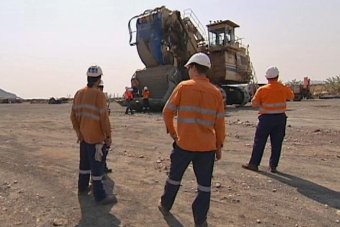A West Australian parliamentary committee investigating the mental health impact of fly-in, fly-out (FIFO) work has been unable to corroborate media reports of suicides, but has found FIFO operations can lead to a “heightened risk of mental health issues”.
In a final report in WA Parliament, the committee found it could not identify the nine publicised suicide cases that triggered the inquiry last year.
Committee chairman Graham Jacobs said a lack of accurate, accessible data made it impossible to establish suicide levels among any specific working group.
The committee recommended the coroner establish a single, searchable database of suicides for specific occupations, including FIFO workers.
“Without an occupation code in that single, searchable database kept by the coroner, there is no way of knowing what the impact of that industry is on that particular cohort,” Mr Jacobs said.
But while the committee was unable to verify the link of suicides to FIFO operations, it concluded that FIFO work could lead to a heightened risk of mental health issues.
‘Workforce may be vulnerable’
The committee identified three studies which indicated the rate of mental health problems among FIFO workers could be 30 per cent, compared to the national average of 20 per cent.
The report acknowledged that more research was required, but said existing research demonstrated “the extent of the problem must not be ignored and work must be undertaken now to mitigate the risks, rather than waiting for the outcomes of future research projects”.
The report said the demographic profile of FIFO workers indicated they faced a higher risk of mental illness and suicide.
What you see is the FIFO industry employing the very demographic that has the highest incidence of mental illness.
Committee chairman Graeme Jacobs
Using national statistics, the committee reported that 20 per cent of all men between 25 and 44 would experience a mental health disorder.
The FIFO workforce is made up of mainly men in this same age group.
“To ignore this demographic profile is to ignore a clear indicator that members of the FIFO workforce may be vulnerable in terms of mental illness,” the report stated.
The committee chairman told Parliament it was important the industry considered the vulnerability of its workforce to the additional stresses of FIFO operations.
“And so that was significant, because what you see is the FIFO industry employing the very demographic that has the highest incidence of mental illness, and that must as we have said in our report be important,” Mr Jacobs said.
Report calls for FIFO code of practice
The committee has called for a code of practice on FIFO operations to directly address the risks to mental health.
“A code of practice is needed because some of the practices of FIFO work arrangements may pose a risk to worker’s mental health,” the report said.
The committee rejected arguments that some workers were not suited to FIFO work, and instead argued that the industry should recognise and address the potential vulnerability of all workers.
“Rather than trying to screen for and recruit workers able to withstand the challenges of a FIFO role, the industry’s emphasis should be on tailoring FIFO roles to accommodate the mental health needs of workers,” the report said.
The committee recommended the code of practice address rosters, fatigue, workplace culture, the impact of FIFO on relationships, communication and accommodation facilities.
The report recommended changes to legislation to ensure workplace health and safety requirements apply to workers while in FIFO accommodation, not just while working on shift.
They have really acknowledged that mental health and safety should be treated with the same level of intent as physical health and safety.
Lifeline WA CEO Fiona Kalaf
“Changes to the law should ensure that a FIFO worker occupying or residing in FIFO accommodation is not exposed to risks to health and safety, including risks to mental health,” the report said.
It also recommended changes to improve the reporting of suicides, attempted suicides and deaths on mine sites, whether on or off shift.
Rio Tinto welcomed the report and said it was reviewing the committee’s recommendations.
Rio, which is expanding its Pilbara operations, said it had a range of programs already in place to promote positive mental health and wellbeing among its FIFO employees.
Fellow iron ore miner BHP Billiton also welcomed the report and said it would consider the findings.
Mental health charity Lifeline WA supported the committee’s calls for more reliable data on FIFO suicides and attempted suicides.
Lifeline WA chief executive Fiona Kalaf said the group was concerned about the lack of credible and reliable data on suicides, but acknowledged there were challenges.
“But in particular whether or not that attempt, or that suicide, has occurred on work premises or during what’s deemed to be work time, and therefore whose responsibility is it to either conduct the investigation or to collate the data for instance,” Ms Kalaf said.
“The other factors we were particularly keen to see acknowledged is that there are unique circumstances that can give rise to mental illness or emotional crisis within the FIFO working lifestyle, and that has also been addressed by the committee.
“I think one of the really important forward steps is that the committee in its recommendations have called for a code of practice on FIFO work arrangements, and in doing so they have really acknowledged that mental health and safety should be treated with the same level of intent as physical health and safety.”

